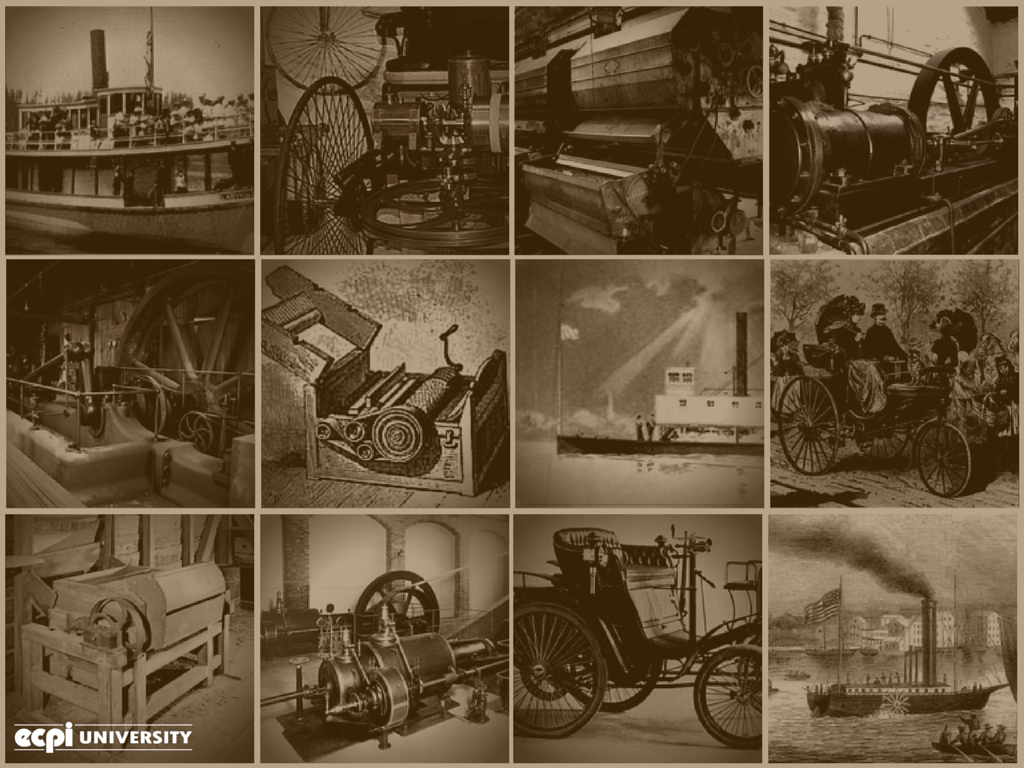
Mechanical Engineering Technology Marvels That Changed the Course of History
Mechanical engineering technology is for the doers. Or as author James A. Michner puts it, "Scientists dream about doing great things. Engineers do them." Much the same, mechanical engineering technologists apply engineering principles with technological developments to plan and develop useful products and machines. This means focusing less on scientific theories and more on direct application of skills and knowledge – i.e. making things happen!
How is this important to current and future mechanical engineering technologists? Here are just a few brilliant people who used their knowledge of mechanics to change the world:
James Watt
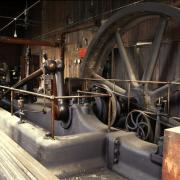 This ingenious mechanical engineer took humanity from farm to factory and straight into the modern world. Just how did he do this? By perfecting the steam engine. The Watt steam engine allowed European factory owners to use the region's vast coal resources to fuel steam engines, the driving force behind the creation of mills and factories that churned out manufactured goods. This was the onset of the Industrial Revolution, a time period that marked the change from subsistence cultures to modern society. But it's important to note that his invention didn't happen all at once. Watt spent well over a decade experimenting and improving upon the use of steam as a source of motive power. And once he did have an operating steam engine, he worked with commercial owners to troubleshoot problems and make improvements and modifications for superior operations.
This ingenious mechanical engineer took humanity from farm to factory and straight into the modern world. Just how did he do this? By perfecting the steam engine. The Watt steam engine allowed European factory owners to use the region's vast coal resources to fuel steam engines, the driving force behind the creation of mills and factories that churned out manufactured goods. This was the onset of the Industrial Revolution, a time period that marked the change from subsistence cultures to modern society. But it's important to note that his invention didn't happen all at once. Watt spent well over a decade experimenting and improving upon the use of steam as a source of motive power. And once he did have an operating steam engine, he worked with commercial owners to troubleshoot problems and make improvements and modifications for superior operations.
Robert Fulton
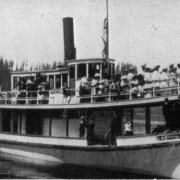 This American engineer and inventor is most notably remembered for developing the first commercially successful steamboat, Clermont. This steamboat and its successors changed how Americans in the early-1800s transported both goods and people. Clermont's maiden voyage from New York City to Albany covered a distance of 150 miles in 32 hours. Before this, commercial sailing vessels took an average of five days to cover the same distance and they were dependent on favorable winds. Goods could now be traveled to farther locations on a more business-friendly schedule. New cities grew up along rivers and farmers and manufacturers were able to increase trade to new marketplaces thereby changing the world's physical landscape.
This American engineer and inventor is most notably remembered for developing the first commercially successful steamboat, Clermont. This steamboat and its successors changed how Americans in the early-1800s transported both goods and people. Clermont's maiden voyage from New York City to Albany covered a distance of 150 miles in 32 hours. Before this, commercial sailing vessels took an average of five days to cover the same distance and they were dependent on favorable winds. Goods could now be traveled to farther locations on a more business-friendly schedule. New cities grew up along rivers and farmers and manufacturers were able to increase trade to new marketplaces thereby changing the world's physical landscape.
Karl Benz
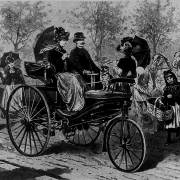 This German engine designer and engineer is credited the invention of the first automobile to be powered solely by an internal combustion engine. He presented the world's first ever car, known as the Patent Motorwagen, in January 1886. And then in 1888, his wife Bertha Benz drove this revolutionary vehicle through the Black Forest to her mother's house on its first-ever long journey, thereby proving the automobile was more than just a technical marvel, it was a functional mode of transportation. Today, unsurprisingly, cars are the number one vehicle used for transportation throughout the world.
This German engine designer and engineer is credited the invention of the first automobile to be powered solely by an internal combustion engine. He presented the world's first ever car, known as the Patent Motorwagen, in January 1886. And then in 1888, his wife Bertha Benz drove this revolutionary vehicle through the Black Forest to her mother's house on its first-ever long journey, thereby proving the automobile was more than just a technical marvel, it was a functional mode of transportation. Today, unsurprisingly, cars are the number one vehicle used for transportation throughout the world.
Eli Whitney
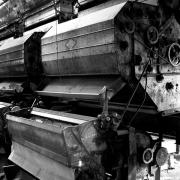 Eli Whitney is most well-known for his invention of the cotton gin, a relatively simple mechanical device that removes the seeds from cotton. Before this invention, the process of seed removal had been so labor intensive that many farmers had abandoned the crop altogether. However, Whitney's cotton gin made the process so simple that cotton once again became a highly lucrative crop and a major export for the American South. Unfortunately, this increased demand meant a rejuvenation of plantation slavery (an industry that had previously been dying out). The growing prevalence of slave ownership would later become such a fiery national issue that it would spark the Civil War, a war that quite literally changed the format of the United States government and irrevocably changed the course of the country's history.
Eli Whitney is most well-known for his invention of the cotton gin, a relatively simple mechanical device that removes the seeds from cotton. Before this invention, the process of seed removal had been so labor intensive that many farmers had abandoned the crop altogether. However, Whitney's cotton gin made the process so simple that cotton once again became a highly lucrative crop and a major export for the American South. Unfortunately, this increased demand meant a rejuvenation of plantation slavery (an industry that had previously been dying out). The growing prevalence of slave ownership would later become such a fiery national issue that it would spark the Civil War, a war that quite literally changed the format of the United States government and irrevocably changed the course of the country's history.
Willis Carrier
Let’s give a huge round of applause to this innovator for the invention of modern air conditioning. While on the surface air conditioning seems like just a luxury, this invention has done so much more than simply cool our homes. Willis Carrier and his air conditioning system changed how we build houses, where we live, and how we spend our time. For instance, in the United States the southern states of Florida, Texas, Georgia, and New Mexico all experienced a population explosion during the latter half of the 20th century, after the advent of modern air conditioning. Additionally, computers and the entire IT industry depend on cooling technologies to keep their internal working temperatures low and operable. While Willis Carrier might not have imagined his machines and technology becoming so ubiquitous, it is hard to refute that modern living wouldn't be the same without the air conditioner.
Learning how to solder this morning. I'm in love. #Nerd #soldering @ ECPI College of Technology http://t.co/qoUd4NS4J8
— Ash (@OatzTheGreat) December 12, 2014
Has the inspiration to innovate hit you yet?
Become a Mechanical Engineering Technologist!
Are you feeling inspired yet? If you enjoy inventing things and coming up with new solutions to help people interact with the world differently and more efficiently, then you should consider obtaining a degree in Mechanical Engineering Technology. Contact ECPI University today for more information on how you could earn a Bachelor of Science degree in Mechanical Engineering Technology in as little as 2.5 years with year-round scheduling that easily matches step with your life. Why wait? Call today. It could be the Best Decision You Ever Make!
DISCLAIMER – ECPI University makes no claim, warranty or guarantee as to actual employability or earning potential to current, past or future students or graduates of any educational program we offer. The ECPI University website is published for informational purposes only. Every effort is made to ensure the accuracy of information contained on the ECPI.edu domain; however, no warranty of accuracy is made. No contractual rights, either expressed or implied, are created by its content.
For more information about ECPI University or any of our programs click here: http://www.ecpi.edu/ or http://ow.ly/Ca1ya.


